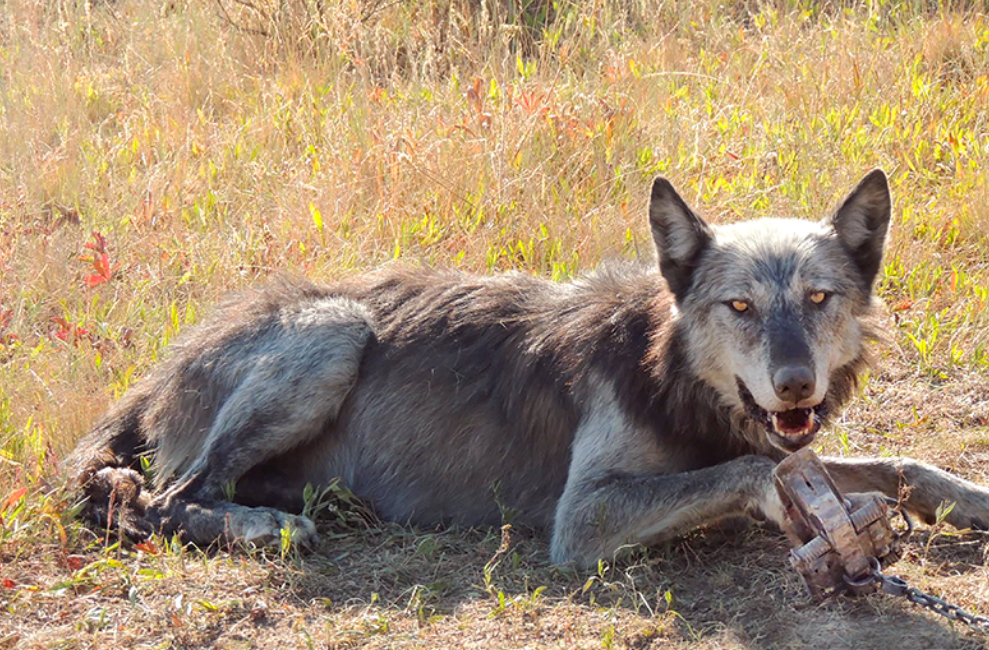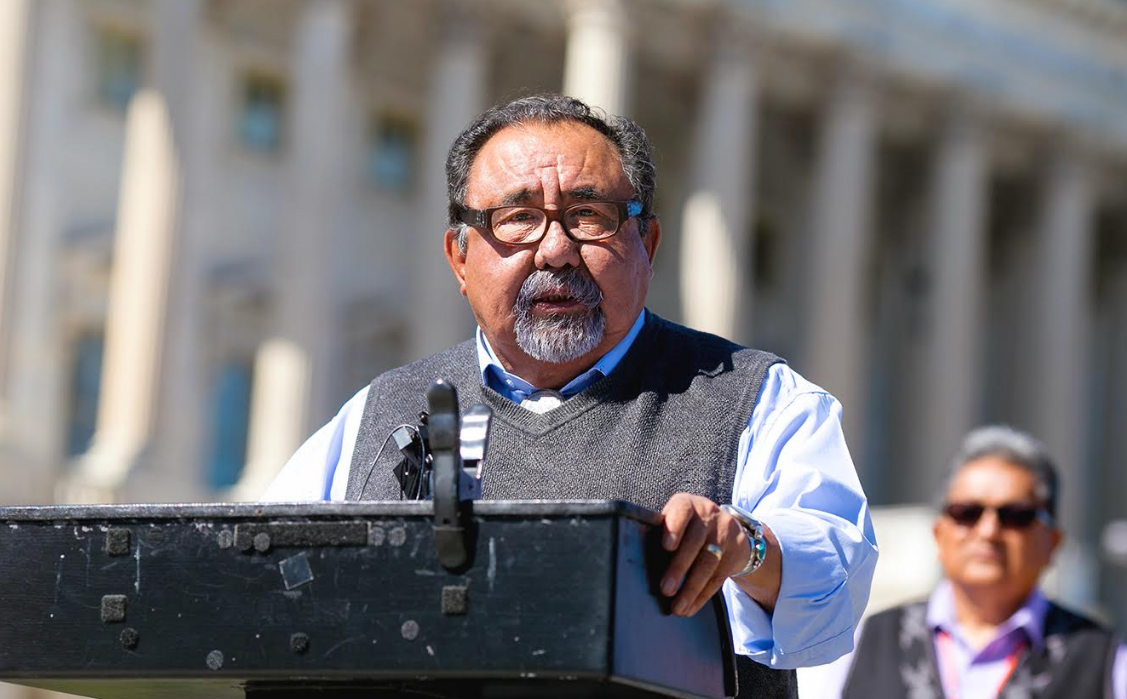
- Details
- By Arianna Amehae
WASHINGTON — “It is abundantly clear that since protections were removed, states have accelerated policies which threaten decades of successful wolf recovery efforts across the country. Please join us in urging Secretary Haaland to revisit the decision to delist Gray Wolves,” closes a letter to fellow lawmakers from Members of Congress Donald Beyer, Jr., Raul Grijalva, and Peter DeFazio.
The Congressmen’s letter reflects many of the positions highlighted in "Family," the short film produced by the Global Indigenous Council. Directed by Rain ("Say Her Name"/"Somebody’s Daughter") and narrated by Crystle Lightning ("Trickster"/"Yellowstone"), in its first week of release "Family" generated over 170,000 views across multiple platforms.
Want more Native News? Get the free daily newsletter today.
The beautifully shot film has received stellar reviews, its impact felt on cultural, historic, and emotional levels. It offers a vignette of tribal peoples’ ancient connection with the wolf. "Family" closes with an appeal to Haaland to return Endangered Species Act (ESA) protections to the wolf that were stripped by former president Donald Trump.

The letter Reps. Beyer, Grijalva and DeFazio are urging their colleagues to sign to Secretary Haaland emphasizes the post-Trump ESA delisting wolf slaughter in Wisconsin that violated tribal treaty rights, and the “anti-wolf” laws signed by governors Gianforte and Little in Montana and Idaho respectively."Family" highlights each.
“The Wisconsin Department of Natural Resources authorized a hunt in late February at the height of breeding season, with a quota of 119 wolves,” the Congressional letter details. “Set to take place over several days, the hunt was called off after 218 wolves, half of which were females and likely pregnant, were slaughtered in just three days,” it continues.
“In April, the Idaho Senate approved a bill that could allow for the killing of up to 90% of the state’s wolf population. Not only do policies like that threaten the long-term stability of the species, but they also enable cruel and inhumane methods of slaughtering,” the letter elaborates, citing how Montana governor, Greg Gianforte, recently extended “hunting and trapping further into the breeding season.”
“These policies promote cruel and inhumane slaughter for recreation,” the members of Congress’ letter to Secretary Haaland concludes.

A spokesperson for the Department of Interior told Native News Online, “We don’t have a comment on the film,” but made the following statement:
“The U.S. Fish and Wildlife Service has not taken a position on recent Idaho and Montana management legislation for the Northern Rocky Mountain (NRM) gray wolf population. The Department of the Interior is reviewing the 2020 final rule that delisted gray wolves outside of the NRM. This final wolf delisting rule is also under active litigation.”
The spokesperson added, “The Interior Department declined to make the Secretary available for comment.” When pressed on whether Secretary Haaland will meet with a delegation of tribal leaders and take receipt of the Wolf Treaty signed by over 120 tribes, the spokesperson declined to comment.
“The wolf is one of our relatives and has an important role in our culture. The leaders of the Great Plains Tribal Chairmen’s Association (GPTCA) tribes were among the first to sign the Wolf Treaty. The Trump administration manipulated so-called endangered species issues in devious ways to undermine our treaties, rights, and sovereignty,” said GPTCA Chairman Harold Frazier, Chairman of the Cheyenne River Sioux Tribe.
In addition to tribal presidents, chairpersons, and councilpersons, prominent water and earth protectors were invited to sign the treaty. Both Winona LaDuke and Tara Houska, currently on the frontlines of the Enbridge Line 3 pipeline struggle, are among the signatories.
Donate today to help us uplift Native Voices, Native Perspectives, and Native News.
In a recent meeting with numerous stakeholders, Principal Deputy Director of the U.S. Fish and Wildlife Service (FWS), Martha Williams, said FWS wanted to include tribal perspectives on wolf management that would result in a more holistic dynamic. Those present said it was clear that “the lack of consultation” by the Trump administration is a major concern for FWS.
“It shows how far we still have to travel that the prospect of a US presidential administration actually adhering to federal laws, and recognizing our rights and their responsibilities, is a cause for optimism,” said award-winning actress Crystle Lightning.
“Who can’t see this decimation of the wolf as part of the continuing war on Indigenous cultures?” Lightning asked.
A. Gay Kingman, Executive Director of the GPTCA, confirmed that “none of the Great Plains Tribal Chairmen’s Association (GPTCA) tribes were consulted on the Trump gray wolf ESA delisting. In this instance, we shall again defend our sovereignty, treaty rights, reserved treaty rights, religious and spiritual freedoms, by insisting that FWS honors the trust responsibility the Trump Administration violated.”
“This Trump action on the gray wolf is one more in a catalog of contraventions and it must be reversed,” Kingman added.
A letter from the Rocky Mountain Tribal Leaders Council (RMTLC) to FWS opposing the removal of ESA protections from the wolf has proved prophetic.
“One statistic alone demonstrates the folly of removing ESA protections from the gray wolf throughout the lower-48 states: since 2011, in the RMTLC region of Montana, Idaho and Wyoming, trophy hunters and trappers have killed some 3,500 gray wolves – that is over half of the existing population in those states. These gray wolves were killed in such large numbers due to federal protections being lifted.”
The RMTLC description was of the decimation of the Northern Rocky Mountain gray wolf population, the remainder of which is now subject to a cull of 85% in Montana and 90% in Idaho if the Interior Department does not intercede.
When asked to comment on Governor Gianforte of Montana signing what Reps. Beyer, Grijalva, and DeFazio describe as “inhumane laws which would allow the slaughtering of wolf pups and the use of snares,” "Family" director Rain had a direct reply.
“Crystle played in Yellowstone. Gianforte would love to play John Dutton in Yellowstone but in real-life he’s a transplant. He’s not a Montanan and his only association with Yellowstone is poaching a Yellowstone National Park wolf that was as familiar with people as it was with elk. Owning a Charlie Russell painting and a pair of Lucchese boots doesn’t make you a cowboy.”
More Stories Like This
Native News Weekly (August 25, 2024): D.C. BriefsUS Presidents in Their Own Words Concerning American Indians
Native News Weekly (December 14, 2025): D.C. Briefs
Wounded Knee Massacre Site Protection Bill Passes Congress
Two Murdered on Colville Indian Reservation
Help us defend tribal sovereignty.
At Native News Online, our mission is rooted in telling the stories that strengthen sovereignty and uplift Indigenous voices — not just at year’s end, but every single day.
Because of your generosity last year, we were able to keep our reporters on the ground in tribal communities, at national gatherings and in the halls of Congress — covering the issues that matter most to Indian Country: sovereignty, culture, education, health and economic opportunity.
That support sustained us through a tough year in 2025. Now, as we look to the year ahead, we need your help right now to ensure warrior journalism remains strong — reporting that defends tribal sovereignty, amplifies Native truth, and holds power accountable.
 The stakes couldn't be higher. Your support keeps Native voices heard, Native stories told and Native sovereignty defended.
The stakes couldn't be higher. Your support keeps Native voices heard, Native stories told and Native sovereignty defended.
Stand with Warrior Journalism today.
Levi Rickert (Potawatomi), Editor & Publisher
